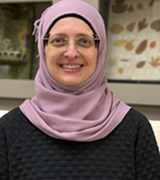Café
WeCLISH Climate Café
Welcome!
We are glad you are interested in conversing with the Café Guest and other participants invested in climate justice, research, policy, advocacy, and actions.
We meet on Zoom | Every 4th Friday of the Month, 9–10 am EST
REGISTER NOW for the next free café event.
Don’t forget to visit About the Café to learn:
What the Climate Café is and is not, its values, ground rules, and more…
Next Climate Café
Friday, March 28, 2025, 9–10 AM (EST)
Zoom: https://westernuniversity.zoom.us/j/92109396447
Meeting ID: 921 0939 6447 | Passcode: 281605 | Register here
Topic:‘We Put Our Hands in the Soil’: School Gardens as Educational Spaces for Sustainable Development
Café Guests
Mariam Takkouch
ORCID: https://orcid.org/0000-0001-8144-9149
Mariam Takkouch is a WeCLISH Fellow and a PhD candidate (ABD) in Curriculum Studies- Environmental and Science Education in the Faculty of Education at Western University. She holds a Collaborative Graduate Specialization in Environment and Sustainability from the Faculty of Science and is currently a graduate student affiliate of WeCLISH centre. Her research spans the areas of environmental and science education; sustainable urban agriculture; interdisciplinary education; social justice, and experiential learning in K-12 and post-secondary programs. Her doctoral research emphasizes the transformative potential of community-based solutions to create more inclusive, resilient, and sustainable urban environments.
Dr Isha DeCoito
ORCID: https://orcid.org/0000-0002-8315-9150
Dr. Isha DeCoito is an Associate Professor of STEM Education and Faculty Scholar. She is cross appointed to Faculty of Science at Western University. Her research spans varied educational contexts including medical programs, school gardens, refugee camps, Indigenous communities, outreach programs, teacher education programs, universities, and school boards. Her research focuses on STEM engagement and STEM career aspirations amongst girls and underrepresented populations, experiential learning, educational technologies (e.g., digital video games, virtual reality), engineering and medical education, professional development, and nature of science conceptions, with a goal of creating equitable and better opportunities for all students.
Description
Let’s drink in the WeCLISH Climate Café Zoom Room and connect over an inspiring conversation with our Café Guests: Mariam Takkouch and Dr Isha DeCoito.
Drawing on Takkouch’s PhD research, this talk will explore the role of two urban agriculture projects – a high school community garden and an elementary school garden – as outdoor environmental education initiatives that shed light on important local and global issues of food security, poverty, and social justice. Specifically, Takkouch will highlight the role of community gardens, as an outdoor educational setting, in fostering connections between high school students and the community to promote positive youth development and social justice. They will also explore the role of a school garden in supporting elementary students’ conceptualization of environmental topics through nature-based exposure and experience.
Please mark your calendar and join us to listen, get inspired, and share your thoughts for an engaging conversation!
Readings
- Takkouch, M. & DeCoito, I. (2024). ‘Not Everyone has the privilege to have good food’: Promoting positive youth development and social justice values in school gardens. Journal of Environmental Studies and Sciences, 1-17. https://doi.org/10.1007/s13412-024-00983-5
- Takkouch, M. & DeCoito, I. (2024). Building strong roots: School-community partnerships for integrating school gardens in environmental and sustainability education. The International Journal of Sustainability Policy and Practice, 21(1), 101-122. https://doi.org/10.18848/2325-1166/CGP/v21i01/101-122




